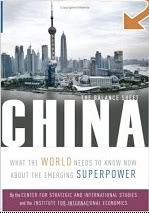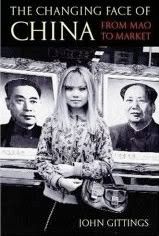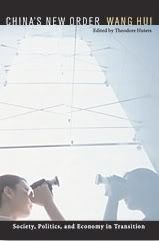China, Neoliberalism, and the WTO
Kim Petersen
For the first time China has attended the G8 summit although it downplayed calls to join the elite body noting quite correctly that it was not yet ready; gross data aside, China is still a developing country. China is far more than the faces of the international city of Hong Kong, Shanghai, which will host the World Expo in 2010, and Beijing, which will be the venue for the 2008 Summer Olympics. China is now the world’s second largest economy and when considered in purchasing price parity (PPP) it is already number one. China is also the world’s most populous country so when the GDP is divvied up, the per capita income is a relatively low $4600 PPP. This is less than Brazil or Venezuela and roughly equivalent to Paraguay.
Yet unlike these South American nations the Chinese economy continues to churn out stellar numbers. The first quarter of 2003 saw China grow at a staggering 9.9 percent. SARS is likely only to make a small dint in this seeming economic juggernaut.
Some pundits have touted China as a successful economic model antithetical to the Washington Consensus. Indeed the state has dirigistically financed mega projects such as the Three Gorges Dam, Qinghai-Tibet railway link, south-north water transfer, west-east power transmission, and west-east gas transfer. As such China is hardly an advertisement for neoliberalism.
Chinese academic Han Deqiang, a professor of economics at Beijing University of Aeronautics and Astronautics has been an outspoken critic of what he sees as the predominantly neoliberal path the Chinese economy has taken. Mr. Han though does acknowledge Keynesian elements in the economy such as lowering interest rates to encourage spending. Says Mr. Han: “When I emphasize neoliberalism, I mean joining the WTO, attracting Foreign Direct Investment (FDI), and belief in the market economy. These are used as two hands to serve the new upper classes: the bureaucratic class and the comprador class.” The bureaucratic class is the class that arrogated powers to itself after the revolution and undermined socialism. The comprador class is the class of Chinese serving as intermediaries for foreign businesses, having benefited from the ongoing opening of the Chinese economy.
Mr. Han is also a staunch opponent of globalization as understood by the IMF, WB, and the WTO. Consequently he argues against Chinese membership in the WTO because Chinese firms simply aren’t strong enough to compete internationally. He cites the example of American carmaker General Motors which “has annual revenue comparable to the total annual gross revenue of China’s first 500 enterprises, and the average gross revenue of China’s first 500 enterprises is only 2% of that of the top 500 in the world.” Chinese companies lack capital, advanced technology, developed markets, and name brand recognition, the latter of which means reduced profits and increased costs.
Noam Chomsky, described as “the leading intellectual figure in the world today in the battle for democracy and against neoliberalism,” explains how the Washington Consensus imposes a global order on other countries. It is a prescription that opens up other, mainly developing economies, for exploitation by so-called advanced capitalist economies. Relatively successful economies such as those in Europe and East Asia did not follow the neoliberal program whereas those countries that did, like Latin America and Russia, were devastated. Mr. Chomsky points to a World Bank report that says, unlike Latin American obedience to market dictates, China was “the most interventionist and price-distorting government of all.” History strongly suggests this governmental management is a better path. Historian Paul Baroch, cited by Mr. Chomsky, claims “there is no doubt that the third world’s compulsory economic liberalism in the nineteenth century is a major element in explaining the delay in its industrialization.”
According to Mr. Han, opening China up to outside competition will result in many national companies being taken over or going bankrupt. This will result in rising unemployment and the increasing vulnerability of banks to bad debts.
Particularly at risk are the peasants. These 900 million people form the bulk of China’s population. Agriculture provides a subsistence living for many of these rural families. But what is happening here is not competition according to the neoliberal prescription. The US government heavily subsidizes its farmers and the 2002 Farm Bill signed into legislation by President George W. Bush massively hiked those subsidies further. Third World countries don’t have the capital to subsidize their farmers so free trade is violated in principle.
So asks Mr. Han, why was China so hell-bent on joining the WTO? Whereas WTO membership is hardly noteworthy in the west, in China the media lauds Chinese membership with much fanfare and indeed it is a prideful event for most Chinese.
It is generally thought that WTO membership would accelerate the reform and opening-up processes. Chinese companies would be energized to compete internationally and develop into an advanced economy -- an economy that would merit G8 membership. Long Yongtu, chief negotiator from the Chinese Ministry of Foreign Trade and Economic Cooperation played down the immediate prospects saying “WTO entry will neither bring in great disaster … nor bring forth economic miracles overnight ... [but] on the whole, advantages outdo disadvantages.”
Mr. Han argues that institutional considerations drove China to WTO membership. Workers and small businesses were under-informed and under-represented and had little input into the political machinery. The government-appointed leaders of the large SOEs stood to gain from WTO entry and were nevertheless beholden to their political masters, so endorsement of WTO membership was a foregone conclusion.
Officials have since become aware of their power and consequently “moral constraint” has disappeared to be replaced by the law of the jungle. States Mr. Han: “Day after day, no person cared about the integral and long term benefit, every one, from top to bottom, even workers, learned to use power for himself, and state-owned enterprises became the object shared by all kinds of forces.” This internal lawlessness has led to the demise of the SOEs. The top skims off the profits for selfish reward while the peasants fall further behind.
Although growth has been impressive in China there have been blips in the economic picture. Mr. Han describes one setback as a period of overproduction at the end of the 1980s featuring extreme competition. A “triangle debts” crisis had emerged. For Mr. Han, the solution was to expand consumer demand thereby absorbing the excess inventory. The wealthy elites couldn’t abide by this and sought instead to draw in more FDI to shore up the growth. It worked; China maintained high growth rates based on the FDI and trade. The FDI concentrated in high value-added industries and labor-intensive industries; other industries suffered.
Growing Income Inequality
Gene Chang at the University of Toledo wrote that the income gap in China is very high but that “there is no effective way to reduce the Gini coefficient,” which measures the concentration of elements. His long-term solution was to “accelerate urbanization in the short run and to promote the growth of the urban sector in the long run.” Mr. Chang argues that the major reason for the disparity is the urban-rural income gap and that income redistribution won’t work and would be harmful to the Chinese economy. Mr. Han responds: “It's a typical prescription for the Chinese future which takes the US as the model. But I don't think it could be suitable to China. If the current tendency lasts, China would only become a peripheral country in the world economic structure. The urban areas have no ability to absorb so much rural labor, not to mention the fast decreasing resources in the world. Redistributing income and advocating a relatively austere life style, is the only way out for China, and also for the world.”
Chinese academia, however, is swayed by the religion of Adam Smith’s “invisible hand” and its modern neoliberal version. Mr. Han wonders about people in this system, where economic Darwinism ensues and the law of the jungle prevails. Adam Smith’s The Wealth of Nations provided the rationale for colonial exploitation: “The colony of a civilised nation which takes possession either of a waste country, or of one so thinly inhabited that the natives easily give place to the new settlers, advances more rapidly to wealth and greatness than any other human society.”
China knows first hand the legacy and humiliation of colonialism. Mr. Han in his book Collision: Globalization Trap and China’s Reality Choice depicts how the trade agreement between the Kuomingtang and the US governments saw China flooded with cheap goods. This led to the closure of tens of thousands of Chinese factories and played a hand in the eventual downfall of the Kuomingtang.
As for the economic path China is embarking upon, Mr. Han forecasts: “In a short term, the current model may work. But in a long time, for example 7-10 years, it will fail, as in Indonesia or Thailand or Argentina.” Eventually Chinese sovereignty will be threatened as China winds up as “the production base of transnational corporations.” In the meantime the Chinese proletariat is threatened with the loss of low-wage jobs. Those who have already lost their jobs face the dog-eat-dog mayhem of increasing competition for jobs in a so-called socialist state that has all but gutted the social system. It is a neoliberal paradigm already known to many Latin Americans and Russian.
The late Chairman Mao Zedong would presumably have been aghast at the growing disparity in China. He foresaw: “To make China rich and strong needs several decades of intense effort, which will include, among other things, the effort to practice strict economy and combat waste, i.e., the policy of building up our country through diligence and frugality.”
Kim Petersen is a China-based teacher and writer on progressive issues. He can be reached at: kimpetersen@gyxi.dk
Link
Read more!



